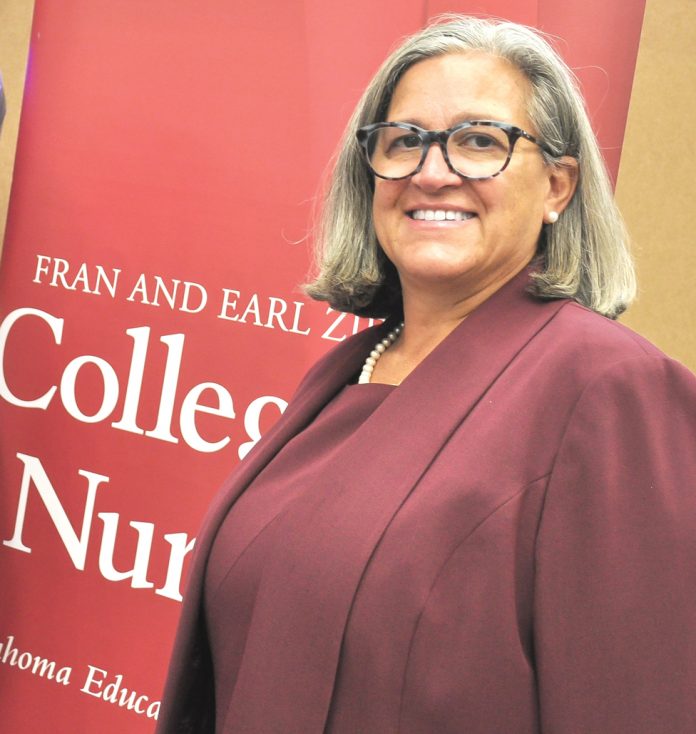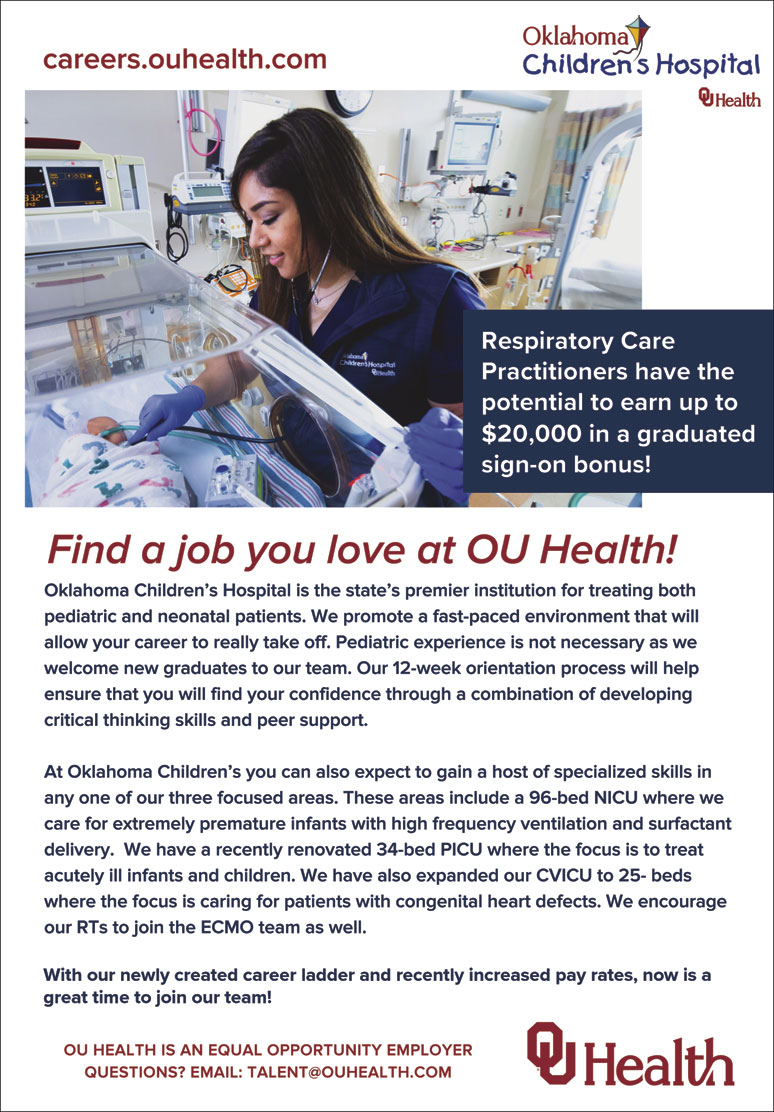
by Bobby Anderson, RN – staff writer
There’s a lack of baccalaureate-prepared nurses in Oklahoma.
There’s also a shortage of nursing faculty in our state.
The remedy to both lies somewhere in partnerships with healthcare facilities and academia.
That was the message University of Oklahoma College of Nursing Dean Julie Hoff, PhD, MPH, RN brought to the recent Oklahoma Nurses Association annual convention.
Just as hospitals are competing for qualified nurses, institutions of higher learning are competing for that same experience to teach tomorrow’s leaders.
“I think No. 1 people don’t understand what an academic health science center is. It is a resource for the state,” Hoff said. “The opportunity for us to integrate is really going to raise nursing up. In my mind nursing comes from a unification model. You can’t teach in the absence of practice. You can’t do research in the absence of practice.”
“They can kind of feed each other.”
Hoff points to the fact that only 40 percent of nurses in Oklahoma obtain their bachelor’s degree as a contributing factor in the faculty shortage.
A common point among frontline nurses is that pursuing a bachelor’s degree results in no pay difference than obtaining an associate’s degree. Nurses see the cost – which can range to upwards of $15,000 – as simply money they will never see back.
“It does impact you financially and it does impact your career mobility and your options,” Hoff said. “There are fewer baccalaureate nurses that are leaving nursing. They’re finding other roles. Healthcare has become complex. We’re the only discipline that doesn’t require a bachelor’s degree to enter.” (story continues below)

OU Health
careers.ouhealth.com
Respiratory Care Practitioners have the potential to earn up to $20,000 in a graduated sign-on bonus!
Find a job you love at OU Health!
Oklahoma Children’s Hospital is the state’s premier institution for treating both pediatric and neonatal patients.
We promote a fast-paced environment that will allow your career to really takeoff.
Pediatric experience is not necessary as we welcome new graduates to our team.
Our 12-week orientation process will help ensure that you will find your confidence through a combination of developing critical thinking skills and peer support.
At Oklahoma Children’s you can also expect to gain a host of specialized skills in any one of our three focused areas.
These areas include a 96-bed NICU where we care for extremely premature infants with high frequency ventilation and surfactant delivery.
We have a recently renovated 34-bed PICU where the focus is to treat acutely ill infants and children.
We have also expanded our CVICU to 25- beds where the focus is caring for patients with congenital heart defects.
We encourage our RTs to join the ECMO team as well.
With our newly created career ladder and recently increased pay rates, now is a great time to join our team!
OU HEALTH
OU HEALTH IS AN EQUAL OPPORTUNITY EMPLOYER
QUESTIONS? EMAIL: T[email protected]
Oklahoma is among the worst states in healthcare outcomes as well as the number of nurses per 1,000 residents.
The United States is also the only industrialized country to practice without a bachelor’s degree.
“My favorite group of students to teach are RN to BSN students,” she continued. “They’re smart. They’re capable and they’ve defended themselves in their position their whole careers and have been made to feel inadequate. When you bring them into the classroom you can celebrate what they know and do and provide them with more theoretical information and they have these ‘Ah-ha’ moments. It’s that higher-level knowledge and skills that a baccalaureate education provides.”
Just a few weeks after the convention, Hoff, along with Norman Regional Health System Chief Nursing Officer, Brittni McGill, MSN, RN, CCRN announced a unique partnership designed to help both the hospital system and the university.
“No one should come forward and say we can build a college of nursing and solve the education crisis in Oklahoma because the faculty aren’t there to do it,” Hoff said. “(Clinical partners) are going to share their clinical experts. We’re going to help their clinical experts become faculty. People will have dual roles – practitioner and teacher.”
OU’s Bachelor of Science in Nursing programs will be expanding onsite into the Norman Regional Health System and Duncan Regional Hospital.
The partnership will create a satellite location of the College of Nursing at Norman Regional’s two hospitals – Norman Regional Hospital and the Norman Regional HealthPlex – as well as Duncan.
Students entering into this program will not only get clinical experience at the hospitals, but they will also attend classes in the Norman Regional Hospital Education Center.
Norman Regional will provide unique hands-on training.
McGill said the partnership is one-of-a-kind.
“I like that we can take the best of both organizations and make it into something that fits both people equally. It truly is a partnership,” McGill said. “It’s something we’ve created from scratch so it’s ours to develop over time.”
The move towards baccalaureate-prepared nurses is gaining ground every day.
In the interest of providing the best patient care and leadership by its nurse corps officers, the U.S. Army, U.S. Navy and U.S. Air Force all require the baccalaureate degree to practice as an active duty Registered Nurse.
The Veteran’s Administration, the nation’s largest employer of registered nurses, has established the baccalaureate degree as the minimum preparation its nurses must have for promotion beyond the entry-level.
The nation’s Magnet hospitals, which are recognized for nursing excellence and superior patient outcomes, have moved to require all nurse managers and nurse leaders to hold a baccalaureate or graduate degree in nursing.
Simply put, “it translates to more opportunity,” Hoff said.
For more information visit: https://nursing.ouhsc.edu/












